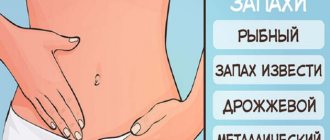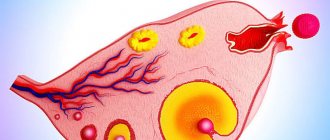Why does thrush occur?
The appearance of thrush is associated with changes in the natural microflora of the vagina. Its composition is influenced by various factors, primarily hormonal levels. Female sex hormones of the second phase of the cycle (which determine preparation for a possible pregnancy) reduce immunity. This significantly increases the chances of fertilization, but has negative health consequences.
If exacerbation of thrush before menstruation occurs regularly, this indicates that there are serious hormonal imbalances.
This condition can be caused by an excess of gestagens (hormones of the second phase of the cycle), which reduce the body’s defenses, and if there are additional factors, they disrupt the natural biocenosis of the vagina.
There are a number of factors that do not themselves cause thrush, but can become an additional cause of the disease:
- abuse of antibacterial soap (it is important to remember that this is a medicine, and not just a hygiene product);
- neglect of hygiene standards;
- unprotected sexual intercourse with partners about whose health the woman knows nothing.
Side effects of some medications play a role.
https://youtu.be/qqBR_7hVDnI
What reasons could cause the problem?
Through long research, doctors have found that there is a whole list of factors that can trigger the appearance of thrush every month before menstruation or less often. They included:
- Weakening of the immune system, which the Candida fungus will definitely take advantage of, because the body in this state cannot resist it. Stress, frequent vitamin deficiencies, illiterate diets disrupt the body's defense mechanisms, which leads to the rapid development of pathogenic flora.
- The use of broad-spectrum antibiotics. Strong medications kill not only dangerous bacteria, but also destroy beneficial microflora. When an imbalance occurs, fungi begin to multiply intensively without responding to the action of the drugs.
- Diabetes mellitus and excessive consumption of flour and other sweets. For the Candida fungus, sweets are a nutrient medium; it actively multiplies in it and lives for a long time.
- Thrush appears before menstruation and in the case of using hormonal contraceptives. The risk increases if the products are used frequently or not as prescribed by a doctor. Against the background of hormonal changes, the immune system weakens, and Candida takes advantage of this to develop unhindered.
- If cheesy discharge is noticed a week before the onset of your period, this may be a consequence of hormonal imbalances. The acidic environment in the vagina changes, estrogen dies, bacteria begin to multiply. Thrush may stop immediately after your period begins, but will become chronic.
- Discharge that repeats every month indicates that the infection has become chronic.
- Failure to comply with personal hygiene standards. Basic rules of cleanliness, carelessly ignored by some patients, lead to chronic thrush.
- The disease can be provoked by a sexual partner. Thrush does not spread during intimacy, but sexual intercourse itself plays the role of an irritant for its activation.
- Sometimes thrush a week before the start of menstruation can appear due to swimming in a dirty pond. Carefully choose places for water recreation, or refuse to swim in a river whose purity you doubt.
Manifestations of candidiasis
Thrush before menstruation, the causes of which are indicated above, does not manifest itself as clearly as in other periods of the menstrual cycle. A few days before menstruation, vaginal discharge intensifies, it acquires an unpleasant odor, a whitish color, and inclusions appear in it, resembling curdled milk in appearance. When menstruation occurs, the discharge becomes less characteristic.
Another group of symptoms that manifest as thrush before menstruation is itching and burning in the genital tract. They intensify with urination, sexual intercourse, active physical activity, accompanied by profuse sweating. It is made easier by washing and treating with skin antiseptics.
For many healthy women, the period before menstruation is associated with discomfort, so they may not notice the signs of thrush.
If the disease begins relatively late, then neither itching nor discharge looks characteristic, and the woman may not pay attention to them.
One of the reasons why thrush appears before menstruation is vaginal dysbiosis. This is a condition when the natural microflora is constantly disrupted, which, under a certain hormonal background, manifests itself as a disease. Typically, a sign of this condition is an unpleasant odor, a large amount of yellowish or whitish vaginal discharge.
Thrush before your period or pregnancy?
It is possible that this phenomenon indicates a successful conception. An increase in the volume of secretions released from the vagina is associated with increased blood circulation in the pelvic area. Pregnancy affects the fact that the amount of hydrogen ions in the vaginal secretion increases - substances that will protect the expectant mother’s body from various harmful microorganisms.
However, at this time, conditions are created for the proliferation of opportunistic fungi, so very often pregnancy is accompanied by candidiasis.
Despite the situation, the disease must be eliminated, otherwise it can be transmitted to the fetus, and the likelihood of rupture during delivery increases.
Diagnosis and treatment
Many women have thrush before their period - why does it often go unnoticed and without treatment? First of all, because its signs may not be obvious, since an increase and change in the color of the discharge, a state of discomfort before menstruation can occur normally. Therefore, to make a diagnosis, a microbiological analysis of a vaginal smear is necessary. It is advisable to take the material for it before the onset of menstruation, but when signs of discomfort appear.
If a woman suffers from candidiasis so regularly that she believes that thrush before menstruation is normal, then it is necessary to undergo examination primarily for sex hormones of the second phase of the cycle and prolactin.
Thrush associated with the menstrual cycle can also occur as a result of taking hormonal contraceptives. This means that this drug is not suitable for the woman or that a completely different method of contraception is needed.
In the treatment of candidiasis, the main role is given to antifungal agents, but when the disease occurs before menstruation, it has its own characteristics. The use of vaginal suppositories, the main dosage form for the treatment of thrush, is difficult because their use during menstruation is ineffective.
The main treatment is Fluconazole, Itraconazole or Nystatin tablets:
- when treating with drugs containing Fluconazole and Itraconazole, a single dose is sufficient;
- Nystatin is taken for up to 14 days.
If the disease occurs regularly, then you need to focus your efforts on combating why thrush begins before menstruation. Hormonal therapy is prescribed, which allows not only to eliminate candidiasis, but also to normalize the cycle, make menstruation less painful and longer. If the cause is hormonal contraceptive pills, then replacement or complete discontinuation of the drug is necessary.
Treatment of thrush that began before menstruation
Candidiasis in the premenstrual period has more severe symptoms. Thus, the itching and odor are more intense than at other times. Until recently, such thrush was not treated, waiting until the menstruation ended. Today pharmacology can offer drugs that will help during such a delicate period of time.
When treating, you need to understand that the elimination of symptoms in itself does not indicate a full recovery. Antifungal therapy requires an integrated approach, and the course must be continued to the end, observing the dosage and density of dosage forms.
Thrush that is not cured can cause inflammation of the appendages and lead to severe pathologies, including infertility, which we discussed above.
Thrush that occurs before menstruation is more difficult to treat. The fact is that not all treatments are available during menstruation. Thus, ointments, creams, suppositories, vaginal tablets, suppositories should not be used, and douching is also contraindicated. Therefore, the treatment regimen includes taking oral medications in the form of tablets or capsules.
To relieve symptoms, doctors often recommend using the following medications:
- Pimafucin
- Clotrimazole
- Terzhinan
- Flucostat
- Diflucan
- Polygynax.
It must be remembered that these drugs have contraindications and are quite toxic, so it is not recommended to use them without the consent of a doctor. At the same time, you need to pay attention to the state of your immunity, since in most cases it is the decline in protective forces that causes thrush. You can use interferon, ginseng tincture, echinacea.
You should pay close attention to your own diet, including more vegetables and fruits. It is good to eat lean meats and fish, eggs, and cereals. But sweets, yeast baked goods, beer and alcohol are temporarily prohibited. Also, do not consume smoked meats, vinegar, hot spices, pickled and fatty foods.
Herbal teas have a good effect, especially chamomile, which has an antiseptic and restorative effect. Garlic is excellent at fighting fungus, so it can be eaten every day.
To restore the natural microflora, you need to drink kefirs and yoghurts with bifidobacteria and lactobacilli. Also, to normalize the bacterial composition, medications can be prescribed - lactofiltrum, bifidobacterin, linex.
Many doctors recommend postponing treatment for thrush until after your period if the symptoms of the disease are not very pronounced. This issue is resolved individually in consultation with the attending physician.
Thrush after menstruation
Vaginal candidiasis can occur at any time during the menstrual cycle. Its appearance after menstruation may also be due to hormonal imbalance. During menstruation, the level of female sex hormones in both phases of the cycle is low, so the vaginal microflora may change. If hormonal fluctuations are too strong or there are additional unfavorable factors, a disease occurs.
Thrush after menstruation can be caused not only by hormonal changes, but also by the use of the following drugs:
- antibiotics;
- cytostatics;
- immunosuppressants;
- hormonal agents.
Taking contraceptive medications and too frequent use of emergency contraception (Postinor and analogues) can also have an effect.
Treatment of this condition involves the use of antimycotics (after menstruation, they can be used in the dosage form of suppositories), as well as a thorough examination to identify the causes of thrush and eliminate them.
The appearance of thrush at the beginning of menstruation
At the beginning of menstruation, there is an imbalance of hormones, which is why thrush appears. In addition, its appearance can be influenced by stressful situations experienced by a woman, as well as severe fatigue.
Thrush before menstruation may completely go away after it, because after cessation, estrogen levels are restored and the vaginal microflora returns to normal. This environment is destructive for a fungal infection, and it cannot multiply in it.
Symptoms at the end of menstruation may not disappear, because in some women hormonal imbalance occurs precisely in the period after menstruation.
If thrush appears at the beginning of your period, it has slightly different symptoms. For example, a characteristic sour smell appears (due to hormonal imbalance). If symptoms do not go away at the beginning of your period, then pads and tampons will only worsen the situation. Because there is an accumulation of wet microflora with many microbes. Try to change hygiene products more often, or even replace them with natural fabric.
conclusions
When asked whether there can be thrush before menstruation, doctors give an affirmative answer, but women often mistake its symptoms for normal discomfort before menstruation. If vaginal candidiasis occurs regularly, it is worth undergoing an examination to identify the causes of this condition. Chronic thrush can be a signal of serious health problems, which can further lead to infertility.
Thrush after menstruation, the causes of which are close to candidiasis before menstruation, also indicates the presence of problems that threaten reproductive health. When planning a pregnancy, a woman needs to undergo examination, including hormonal characteristics, as well as the presence of candidiasis in the vagina.
What are the dangers of thrush?
The appearance of thrush can cause pathologies:
- The appearance of erosions. Thrush can affect the vaginal mucosa and then spread to the cervix.
- The birth canal and vulva become rough.
- Inflammation of the internal genital organs appears.
- Adhesions form.
- Infertility appears.
- Chronic diseases such as cystitis, urethritis, pyelonephritis occur.
To prevent this from happening, it is necessary to consult a doctor for help when the first symptoms appear.
Treatment
Vaginal yeast infections respond well to medication as well as some home treatments.
Drug treatment
Antifungal drugs help women get rid of thrush
In most cases, women are able to get rid of vaginal yeast infections at home. To do this, they usually use over-the-counter medications, which include the following:
- antifungal medications that must be inserted into the vagina daily for a week or less;
- antifungal ointments or creams;
- single doses of antifungal agents such as fluconazole.
For severe or recurrent vaginal yeast infections, your doctor may prescribe oral medications, vaginal creams, or strong suppositories.
During treatment, doctors strictly do not recommend sexual activity to patients, since this can only worsen the infection.
Lack of menstruation due to thrush
Delayed menstruation often occurs as a result of infectious, viral or fungal diseases.
Candidiasis does not affect the regularity of the menstrual cycle.
Delay can be caused by hormonal imbalances, inflammatory processes, stressful situations and poor lifestyle.
Cycle disruption is accompanied by thrush during menopause. The absence of menstruation in this case is caused by hormonal imbalance. Candidiasis occurs against the background of suppressed immune defense. A woman can connect two factors with each other, but in fact they do not depend on each other. To mitigate the signs of menopause, it is necessary to take specialized medications. Their use is carried out after consultation with a gynecologist.
How does it affect menstruation?
If you have a yeast infection, one of the most common questions you may have is does yeast infection affect your period and can it cause a delay?
However, if you get your period while having a yeast infection, it can cause serious discomfort. Thrush during menstruation worsens due to an excessively humid environment. These days, keeping your vagina dry becomes a challenge. You have to wash yourself thoroughly every time you change a sanitary pad. Additionally, blood flow keeps the area moist.
Can a yeast infection cause cycle problems? Does thrush cause a delay in menstruation? Medicine does not yet provide answers to these questions. But there are effective ways to quickly get rid of candidiasis and prevent further relapses.
Treatment of the disease
If thrush and menstruation are often combined, you have to look for ways to get rid of the disease during this period. Only an integrated approach will help:
- Find the cause of exacerbations and treat it.
- Observe hygiene rules.
- Use special medications.
- Change your eating habits.
Hygiene rules
To prevent thrush from returning after your period, you should stop using sanitary tampons. They are placed inside the vagina, absorbing secretions, and serve as a favorable environment for an increase in the number of candida. It is better to use sanitary pads and change them as often as possible.
You will have to give up sexual activity for the duration of treatment, because during sexual contact an exchange of microflora occurs. This leads to an exacerbation of the disease and infection of the partner.
During menstruation, you need to wash yourself at least three times a day, and more often when changing your pad. Panties should be made from natural materials - synthetics provoke profuse sweating, and this contributes to increased candidiasis.
Medications
Treatment of thrush during menstruation is complicated by the inability to use products for vaginal administration. All antifungal drugs are supplied in the form of creams, ointments, suppositories and suppositories. They cannot be used during menstruation.
Candidiasis during menstruation is treated with tablets - Terzhinan, Flucostat, Pimafucin. Their disadvantage is a large number of side effects due to the general effect on the body. Therefore, you cannot choose a medicine on your own without consulting a doctor.
Traditional methods
An effective method of treatment is douching. But you can’t douche during your period. Therefore, the only home method to help the body with thrush is to eat more healthy foods containing vitamins and minerals. Helps fight thrush:
- freshly squeezed carrot juice 1.5-2 glasses before meals;
- a glass of pumpkin juice twice a day after meals;
- refusal of flour and sweets.
How to prevent thrush before menstruation
If candidiasis has once been diagnosed, the fungi remain forever in the vaginal microflora.
To avoid relapses, you will need:
- Observe personal hygiene rules.
- Maintain your diet and diet. Eating less sweets and more vitamins will reduce the risk of candida overgrowth.
- Select underwear and clothing taking into account weather conditions and body size. Clothes that are too tight impede blood circulation, while clothing that is too light leads to hypothermia. Both factors negatively affect the immune system, leading to an exacerbation of candidiasis.
- Treat all systemic diseases in a timely manner, use immunomodulators if necessary.
- Use protective equipment during sexual intercourse.
By following these recommendations, you will not have to worry about candidiasis that occurs every month before your period. Compliance with these rules will take much less time and effort than monthly treatment of pathology.
Causes of thrush
Your browser is out of date.
Please update it. ATVmedia: Stavropol News
doctor of the highest qualification category, chief physician of the Clinic of Innovative Technologies, work experience 41 years
Thrush or vulvovaginal candidiasis is a common disease of the vaginal mucosa. The main reason for its appearance is a fungal infection.
In fact, the presence of yeast-like fungi on the mucous membranes of the mouth, intestines, and vagina in small quantities is a common normal variant that occurs in both women and men. However, when fungi on the mucous membranes begin to actively develop, the situation gets much worse. It is then that the process enters the active disease stage.
Read more about what contributes to the appearance of candidiasis in our article.
One of the causes of thrush is a violation of the microflora in the reproductive organs, which is closely related to changes in the acid-base balance, hormonal levels of the body, taking antibiotics and other reasons. Menstruation is provoked by the first two reasons, that is, they change the acid-base balance and hormonal levels, which is why thrush often worsens before menstruation.
With candidiasis, the microflora of the genital organs suffers
Thrush is a genitourinary infection caused by the yeast-like fungus Candida albicans. This disease was popularly called thrush for the curdled vaginal discharge and the same white coating that forms on the penis in men.
It is believed that cand{amp}gt;
Taking antibiotics kills not only pathogenic microbes, but also beneficial ones. Lactobacilli die, resulting in a decrease in acidity. An alkaline environment is quite fertile for the development of fungi, and they begin to multiply intensively.
If thrush appears before menstruation with enviable regularity, we can talk about permanent candidiasis. Before the onset of menstruation, in the final phase of the menstrual cycle, conditions are created that contribute to the exacerbation of the disease.
Thrush is a very delicate problem
The causes of thrush before menstruation are as follows:
- The level of hormones - progesterone and estrogen - decreases. Along with them, the production of mucus, which protects the vagina from the penetration of microorganisms, decreases.
- The acid-base balance changes towards alkalization, which creates favorable conditions for the proliferation of fungi.
- Immunity also decreases before menstruation.
Thrush before your period is not normal. This is a pathology that needs to be diagnosed and treated, since thrush destroys the walls of the vagina. Ulcers and lesions form on the skin. And damage to the skin and mucous membranes is an open door for other infections.
The symptoms of thrush before menstruation differ little from the symptoms of this disease, which worsens at other times. This:
- Itching in the perineal area.
- Increased dryness of mucous membranes.
- Curd-like discharge with a sour, milky odor.
- Burning when urinating.
- Swelling of the labia majora, redness.
Some women believe that thrush can cause a delay in menstruation. But concerns about the impact of thrush on your periods are unfounded. The fact is that the delay of menstruation and the recurrence of thrush can be influenced by similar factors: hormonal deficiency, metabolic disorders in the body, stress, and the psychophysical state of the woman.
The disease is often accompanied by severe itching
If thrush is suspected, which is determined visually by the condition of the external genitalia, a smear is made and sent to the laboratory. In laboratory conditions, candida is found in plaque and cheesy discharge.
We invite you to familiarize yourself with the most effective suppositories for treatment of thrush in women: what are they?
The fact is that before menstruation, itching, burning and dryness can occur not only as a consequence of thrush, but also as a result of a sharp decrease in hormone production. Women go to the doctor with suspected candidiasis, but it turns out that the woman does not have this fungal disease. Therefore, if the disease is suspected, research into the cause and treatment of thrush before menstruation is necessary. During menstruation and in the first phase of the cycle, the examination may not be effective enough.
An examination for candidiasis is carried out by a gynecologist. For this disease, the following medications are prescribed, listed in the table. It is advisable to carry out treatment before the start of the menstrual cycle in the second phase, and it is carried out locally, with vaginal suppositories. Oral medications are less commonly prescribed.
| Vaginal | Oral |
| Terzhinan, | Mikomax |
| Nystatin | |
| Gyno-Pevaril | Mikosist |
| Polygynax, | Flucostat. |
| Pimafucin | |
| Irunin | Fluconazole |
| Livarol | Diflucan |
| Clotrimazole. | |
Nystatin is a drug narrowly targeted against Candida fungus, produced in the form of tablets, ointments and suppositories. In ointment form, Nystatin is used as tampons.
Nystatin is often prescribed for treatment
Pimafucin is also available in the form of suppositories, creams and tablets. Pimafucin tablets are used against intestinal candidiasis. The cream is used for the external genitalia, against fungus on the skin. Suppositories are used vaginally.
Traditional medicine is not able to completely get rid of candidiasis, but you can provide some help to yourself using witchcraft remedies. For example, a decoction of oak bark, with its tanning properties, heals wounds and ulcers and strengthens the walls of the vagina.
Chamomile decoction washes out colonies of fungi from the vagina and relieves irritation. All these remedies are used before the onset of menstruation, as soon as symptoms of thrush appear. During menstruation, the use of decoctions is not recommended for two reasons:
- The effectiveness of these means and procedures will be extremely low.
- The female body during menstruation is vulnerable to infections.
Chamomile, as already mentioned, has a calming effect, and other herbs are effective against inflammation and pathogenic microflora. Especially yarrow. Herbs are taken in equal proportions, thoroughly crushed and mixed. For the decoction, take 1 tablespoon per half liter of water. The collection is poured with boiling water, brought to a boil and then left to cool. The decoction for douching should be comfortably warm. You can douche and wash yourself with it.
You can also use chamomile decoction at home.
What's the forecast?
Candidiasis is not considered an incurable disease. Modern medicines can cure acute candidiasis within 4-5 days. Treatment of a chronic disease takes longer: from 4 months to a year.
But candidiasis is prone to relapses. And since the fungus is easily reintroduced into the body through a carrier partner, or as a result of being in public places, re-infection cannot be ruled out. This is largely due to weakened immunity. Repeated infection can lead to exacerbation of thrush before menstruation.
Women prone to candidiasis simply need to pay attention to what they eat. The fungus feels at ease in an alkaline environment, and this is greatly facilitated by the consumption of flour products, sweets, and foods containing large amounts of carbohydrates. Particular attention should be paid to the foods consumed in the last phase of the cycle, before menstruation, if thrush always appears before menstruation.
We invite you to find out why there is a red spot after mantu
After the course of treatment, the woman should be regularly monitored by a doctor and if a new appearance of the fungus is suspected, she should seek help. It is important to know that you should not douche before the examination. The result of the analysis may be inaccurate, since as a result of douching, especially with the use of antiseptics, the fungus is washed out of the vagina, and a significant part of the microorganisms die.
How are thrush and periods related? A common ailment that often worries a woman in the middle of her cycle is thrush or vaginal candidiasis. This is a fungal infection caused by an overgrowth of Candida (a form of yeast) in the vaginal lining.
Symptoms are nonspecific and include vaginal itching and a thick, cottage cheese-like discharge. Some women also experience pain or discomfort during urination and sexual intercourse.
Why thrush appears every time before the onset of menstruation is a pressing question. Let's look at the mechanism of relapse, determine its causes and find out how to get rid of the annoying disease.
Causes of thrush
Candida is part of the normal vaginal flora. Its growth is controlled by other microbes of the normal flora (mainly Lactobacillus), which coexist without causing harm to the host. However, certain changes in the vaginal environment or host immunity can affect the balance of the flora, leading to Candida overgrowth.
At the end of the cycle, hormonal changes occur in the body. We begin to eat more, we are craving sweets, and stomach upsets occur. The microflora of the vagina changes, thus, thrush appears before menstruation.
Estrogen
Estrogen affects both the vaginal epithelial cells (the inner lining of the vaginal wall) and the Candida yeast. The effect of estrogen on vaginal cells ultimately makes a woman more vulnerable to infections. Estrogen promotes the production of glycogen in vaginal cells, and increased glycogen levels provide an ideal food source for Candida to grow.
Under such conditions, a recurrence of thrush before menstruation is a normal reaction of the body. This also explains why pregnant women and those taking combined oral contraceptives (COPs) or hormone replacement therapy (HRT) are more at risk of developing candidiasis.
All of these situations are associated with high estrogen levels. This also explains why thrush is less common in prepubertal girls and postmenopausal women with relatively low estrogen levels.
pH changes
Causes of candidiasis in the premenstrual period
According to medical statistics, the occurrence of thrush before menstruation is not such a rare occurrence. In such a situation, it is important to understand that fungal infection of a woman’s genital organs is caused by a failure of the normal functioning of her body. This is why candidiasis appears in the premenstrual period, as well as after menstruation - the infection chooses the most favorable time for its development, when the beneficial microflora cannot resist it.
So why does thrush appear before your period? The activation of harmful microorganisms in the vaginal cavity can be caused by a restructuring of the hormonal system. In this case, a decrease in progesterone and estrogen levels has a huge impact on the state of the vaginal flora. Such changes in the functioning of endocrine organs negatively affect the state of immune defense. Therefore, at this stage of the menstrual cycle, a woman’s body is more susceptible to various infectious diseases. During this period of time, there is a significant increase in the amount of mucus discharged from the vaginal cavity, which causes an increase in the intensity of growth and development of fungi.
Violation of the healthy balance of vaginal microflora and the appearance of signs of candidiasis can be triggered by some associated factors. The cause of exacerbation of thrush before menstruation can be:
- sudden change in climatic conditions;
- use of antibacterial drugs;
- violation of personal and intimate hygiene of a woman’s body (especially during the onset of menstruation);
- reduction of the body's natural defenses;
- some endocrine pathologies (diabetes mellitus);
- lack of barrier protection during sexual intercourse;
- the use of various gels, toilet soap and other cosmetic products that are not suitable for intimate hygiene;
- viral diseases that reduce immunity (flu, ARVI);
- disruption of hormonal regulation.
Recommendations for caring for the intimate area
Why does thrush happen so often before menstruation? The reason for this phenomenon is often the transition of pathology to a chronic form, which develops as a result of self-medication of patients. In any case, candidiasis causes discomfort in a woman, so if frequent exacerbations of this disease occur, you should follow the advice of specialists. Here are some of them:
- During menstrual periods, it is prohibited to use tampons, especially during exacerbation of a fungal infection.
- It is not recommended to use medicinal douching during this period.
- The washing procedure should be performed at least 2 times a day; for this purpose, during menstruation, you need to use various medicinal solutions and herbal decoctions.
- During menstruation, suppositories and other local remedies should not be used independently, without a doctor’s prescription.
- Changing sanitary pads should be done frequently.
If thrush appears in the vagina before menstruation, this is due to the activation of fungal microflora in the patient’s body. Sometimes this phenomenon is also complicated by candidiasis of the oral cavity. Often, the signs of such an illness disappear on their own, and this indicates the transition of the pathology from the active form back to the passive stage.
Attention! If thrush occurs before menstruation, and after it the symptoms of the disease suddenly subside, this is normal. This phenomenon can be considered a sign of chronic vaginal candidiasis, which develops as a result of improper or untimely treatment of the disease and lack of prevention.
To avoid serious complications of this disease, doctors recommend that women treat all acute diseases of the genital area in a timely manner and maintain an active immune system. Thrush before menstruation requires special care - therefore, if it occurs, the patient must follow all of the above rules. Only by following the advice of a gynecologist will you be able to cope with this unpleasant illness and eliminate the symptoms of a fungal infection for a long time.








